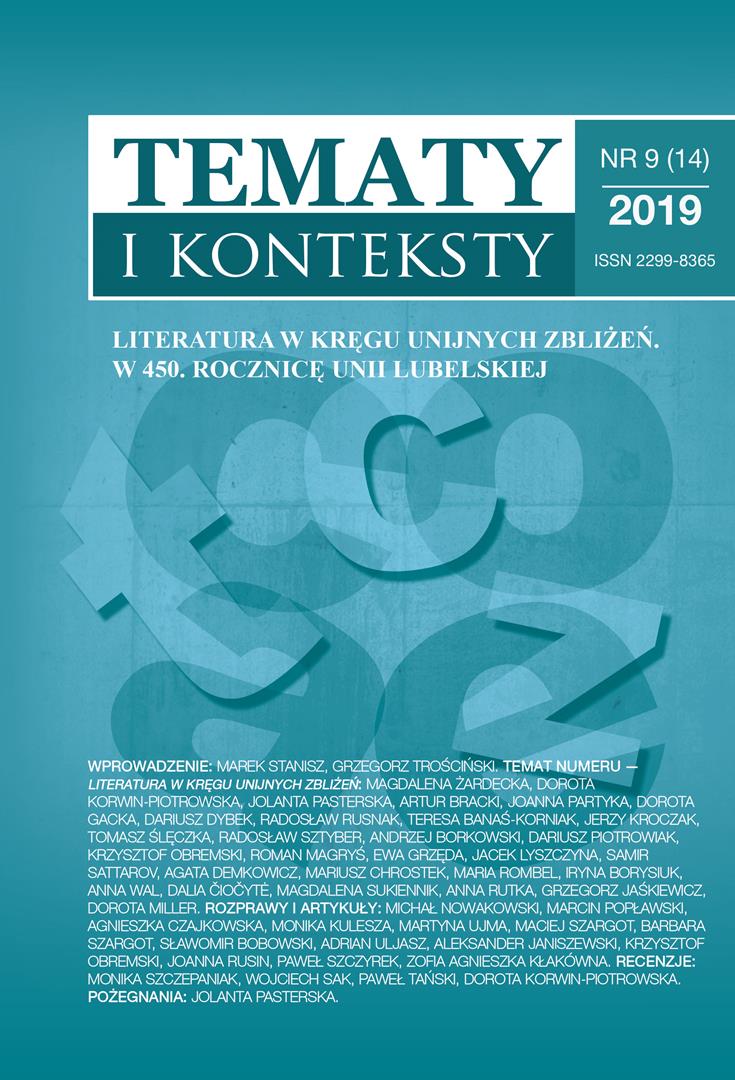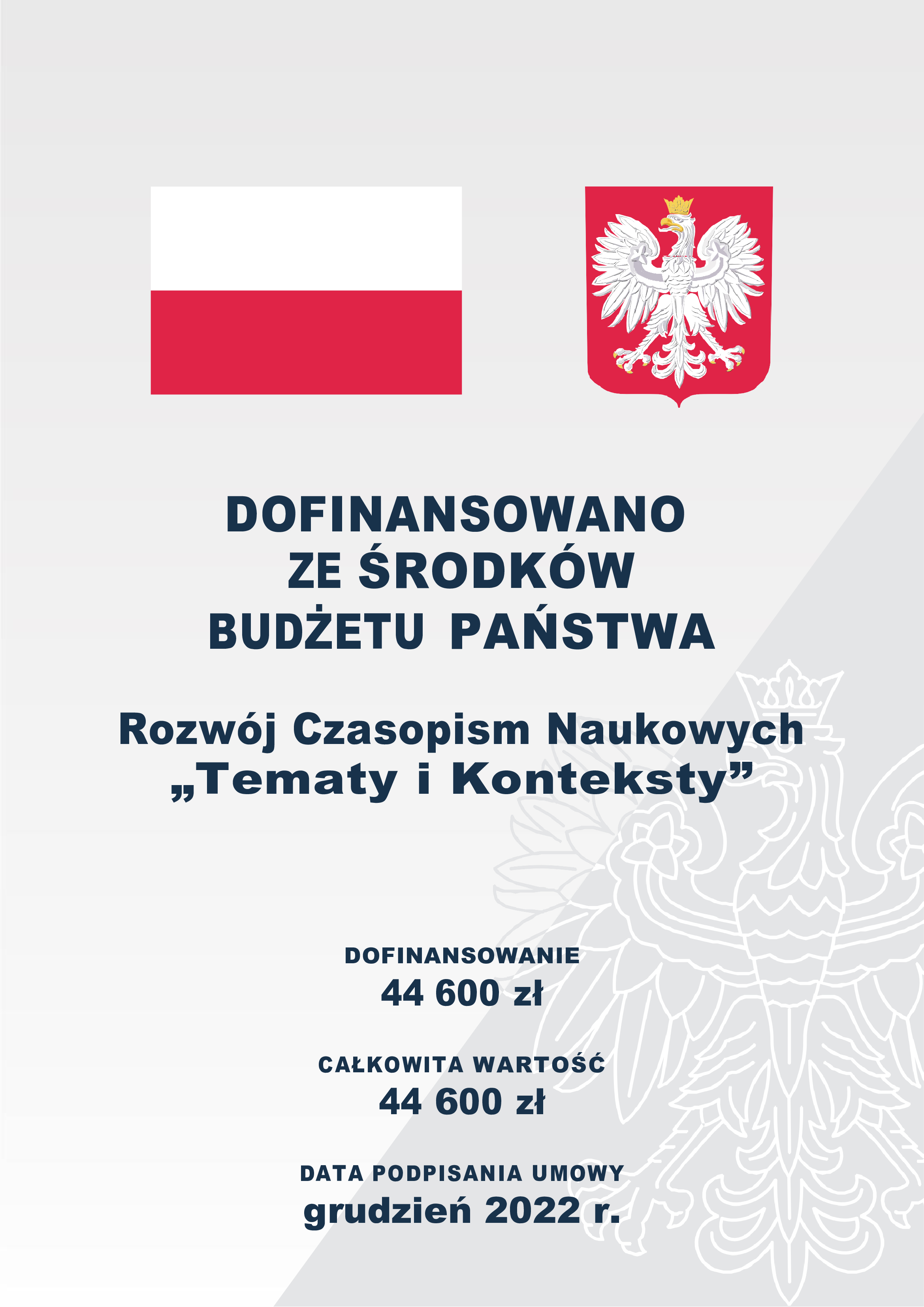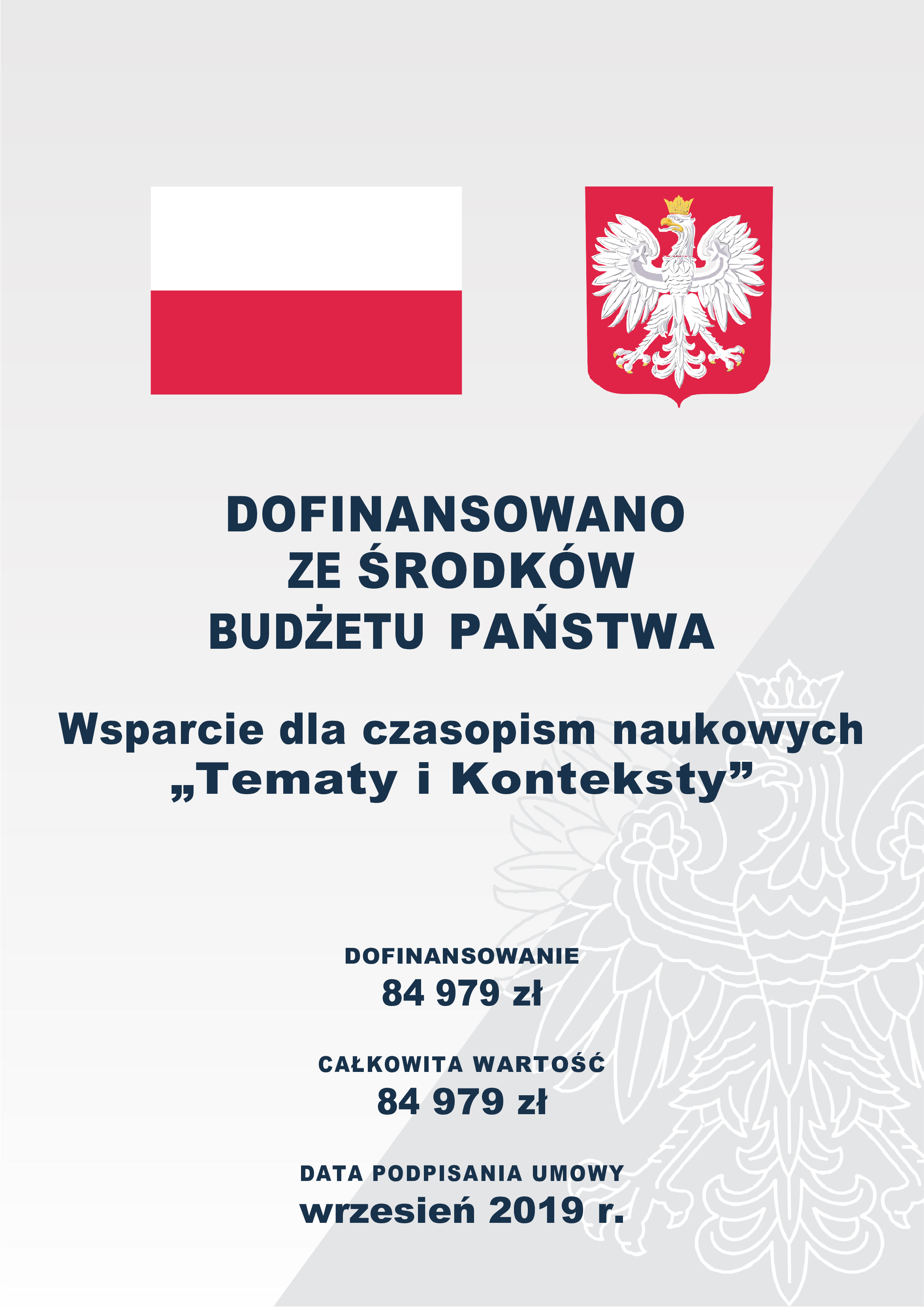Models of Polish ‘Union’ Prose. An Attempt at Classification
DOI:
https://doi.org/10.15584/tik.2019.4Keywords:
migration prose, description models, multiculturalism, post-colonialism, contestationAbstract
Poland’s accession to the European Union and the democratization of the country resulted in a change in the specificity of the Polish emigration prose. Its political dimension was subdued. The status and role of the writer-emigrant changed. Now, without the feeling of having betrayed his/her homeland or language, the writer has become a chronicler of the life of compatriots abroad and an observer of the culture of the country of settlement. The focus of the present considerations is an attempt to characterize three models according to which the description of sociological and cultural phenomena takes place. The first one covers the type of stories symptomatic of migration in which the characters are young people without complexes, curious about the world, wishing to discover it. In this case, we are dealing with intercultural texts that attempt to describe the new culture of the country of settlement and the related identity experiences. The second model uses a model present in postcolonial literature. The hero of this prose is an oppressed migrant whose “mission” is, in a sense, to conquer the new country in order to become a “colonizer” and lose the status of a “colonized” one. He/she thus stands in opposition to a foreign world and the new culture/cultures. The third variant collects polemic works in the face of both this doctrine and the post-colonial discourse, both of which, entering into dialogue with the above mentioned forms, create their own model of counter-discourse.
Downloads
References
Antoniuk D., Polski plastik najemczy, w: Na końcu świata napisane. Autoportret współczesnej polskiej emigracji, Katowice 2008.
Bolec J., Zmartwychwstanie śmieciarza, w: Na końcu świata napisane. Autoportret współczesnej polskiej emigracji, Katowice 2008.
Brzezińska G., Irlandzki koktajl, Warszawa 2010.
Czerwiński P. Międzynaród, Warszawa 2011.
Czerwiński P., Przebiegum życiae czyli Kartonowa sieć, Warszawa 2009.
Czerwiński P., Zespół ojca, Warszawa 2017.
Gretkowska M., My zdies’ emigranty, wyd. II, Warszawa 1995.
Hołdyńska E., Emigracja ambicji, Poznań 2017.
Kępski P., Single, Warszawa 2009.
Kopaczewski G., Global Nation. Obrazki z czasów popkultury, Wołowiec 2004.
Koziarski D, Socjopata w Londynie, Warszawa 2007.
Kudyba W., Imigranci wracają do domu, Warszawa 2018.
Latała K., W krainie wietrznych deszczowców, w: Na końcu świata napisane. Autoportret współczesnej polskiej emigracji, Katowice 2008.
Miklasz A., Polska szkoła boksu. Powieść emigracyjna, Kraków 2009.
Orzeł M., Dublin – moja polska karma, Kraków 2007.
Ozaist J., Wyspa obiecana, Kraków–Łobez 2015.
Parys-White D., Emigrantka z wyboru. Opowieść londyńska, Katowice 2008.
Pawluśkiewicz J., Pani na domkach, Kraków 2006.
Słabuszewska-Krauze I., Hotel Irlandia, Warszawa 2006.
Wąsowicz J., Przystanek Londyn, Wyd. JanKa 2015.
Wyszkowski M., Po lewej stronie świata, Warszawa 2010.
Borkowska G., Perspektywa postkolonialna na gruncie polskim. Pytania sceptyka, „Teksty Drugie” 2010, nr 5.
Burzyńska A., Markowski M.P., Teorie literatury XX wieku. Antologia, Kraków 2007.
Butler J., Gra płci, tłum. I. Kurz, „Dialog” 2003, nr 20.
Dąbrowski M., Proza migracyjna: źródła i znaczenie, „Testy Drugie” 2016, nr 3.
Dąbrowski M., Tekst międzykulturowy. O przemianach literatury emigracyjnej, Warszawa 2016.
Domańska E., Posłowie, w: L. Ghandi, Teoria postkolonialna: wprowadzenie krytyczne, tłum. J. Serwański, Poznań 2008.
Filipowicz H., „Polska literatura emigracyjna” – próba teorii, „Teksty Drugie” 1998, nr 3.
Goerke N., Koktajl wielowarzywny, w: Sarmackie krajobrazy. Głosy z Litwy, Białorusi, Ukrainy, Niemiec i Polski, red. M. Pollack, Wołowiec 2006.
Gosk H., My i oni, czyli o (nie)możliwości zostania tubylcem, w: P. Czapliński, R. Makarska, M. Tomczok, Poetyka migracji. Doświadczenie granic w literaturze polskiej XX i XXI wieku, Katowice 2013.
Gosk H., Opowieści „skolonizowanego/kolonizatora”. W kręgu studiów postzależnościowych nad literaturą polską XX i XXI wieku, Kraków 2010.
Gosk H., Opowieść (o) współczesnej postaci literackiej, „Polonistyka” 2006, nr 10.
Heucklelom K. van, Od „Polish Remover” do „polskiej szkoły boksu”. Polskość w najnowszej literaturze migracyjnej, w: Polonistyka w Europie. Kierunki i perspektywy rozwoju, red. G. Filip, J. Pasterska, M. Patro-Kucab, Rzeszów 2013.
Karwowska B., Druga płeć na wygnaniu. Doświadczenie migracyjne w opowieści powojennych pisarek polskich, Kraków 2013.
Mostwin D., Dzieje rodziny przeszczepionej, „Pielgrzym” 1999, nr 9.
Narracje migracyjne w literaturze polskiej XX i XXI wieku, red. H. Gosk, Kraków 2012.
Nęcka A., Ostatni gasi światło”. Polska proza unijna po 2000 roku wobec problemu migracji unijnej, „Tematy i Konteksty” 2015, nr 5.
Niewrzęda K., Poszukiwanie całości, Bydgoszcz 1999.
Pasterska J., „Lepszy” Polak? Obrazy emigranta w prozie polskiej na obczyźnie po 1945 roku, Rzeszów 2008.
Pasterska J., Wygnanie i mit. Szkice o pisarzach (e)migracyjnych, Rzeszów 2019.
Pasterski J., Inne wyzwania. Poezja Bogdana Czaykowskiego i Andrzeja Buszy w perspektywie dwukulturowości, Rzeszów 2011.
Stokfiszewski I., Zwrot polityczny, Warszawa 2009.
Tarnowska B., Między światami. Problematyka bilingwizmu w literaturze. Dwujęzyczna twórczość poetów grupy „Kontynenty”, Olsztyn 2004.
Teodorowicz-Helman E., Polska literatura (e)migracyjna w Szwecji po roku 1981. Próby terminologiczne i badawcze, w: Między językami, kulturami, literaturami. Polska literatura (e)migracyjna w Berlinie i Sztokholmie po roku 1981, red. E. Teodorowicz-Helman, J. Gesche, współpraca M. Brandt, Sztokholm 2013.
Thompson E., Trubadurzy imperium. Literatura rosyjska i kolonializm, Kraków 2000.
Tomczok M., Emigranctwo i nomadyzm w „Niebieskiej menażerii” Izabeli Filipiak, w: Poetyka migracji. Doświadczenie granic w literaturze polskiej przełomu XX i XXI wieku, red. P. Czapliński, R. Makarska, M. Tomczok, Katowice 2013.
Warkocki B., Homo niewiadomo. Polska proza wobec odmienności, Warszawa 2007.
Winnicka E., Angole, Wołowiec 2014.
Zduniak-Wiktorowicz M., Filologia w kontakcie. Polonistyka, germanistyka, postkolonializm, Poznań 2018.
Zduniak-Wiktorowicz M., „W szpagacie”. Pisarz między Polską a Niemcami, w: Poetyka migracji. Doświadczenie granic w literaturze polskiej przełomu XX i XXI wieku, red. P. Czapliński, R. Makarska, M. Tomczok, Katowice 2013.
Downloads
Published
How to Cite
Issue
Section
License
Copyright (c) 2019 Tematy i Konteksty

This work is licensed under a Creative Commons Attribution-NonCommercial-NoDerivatives 4.0 International License.




